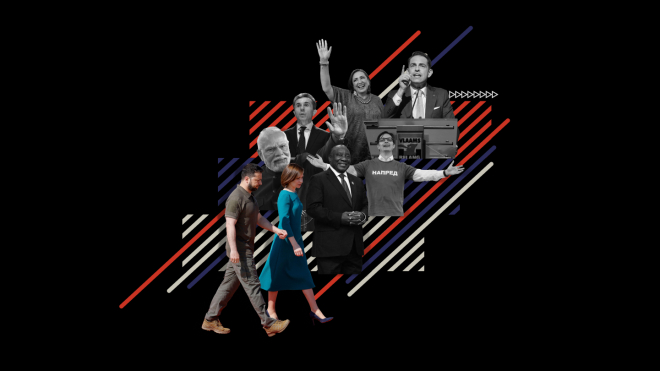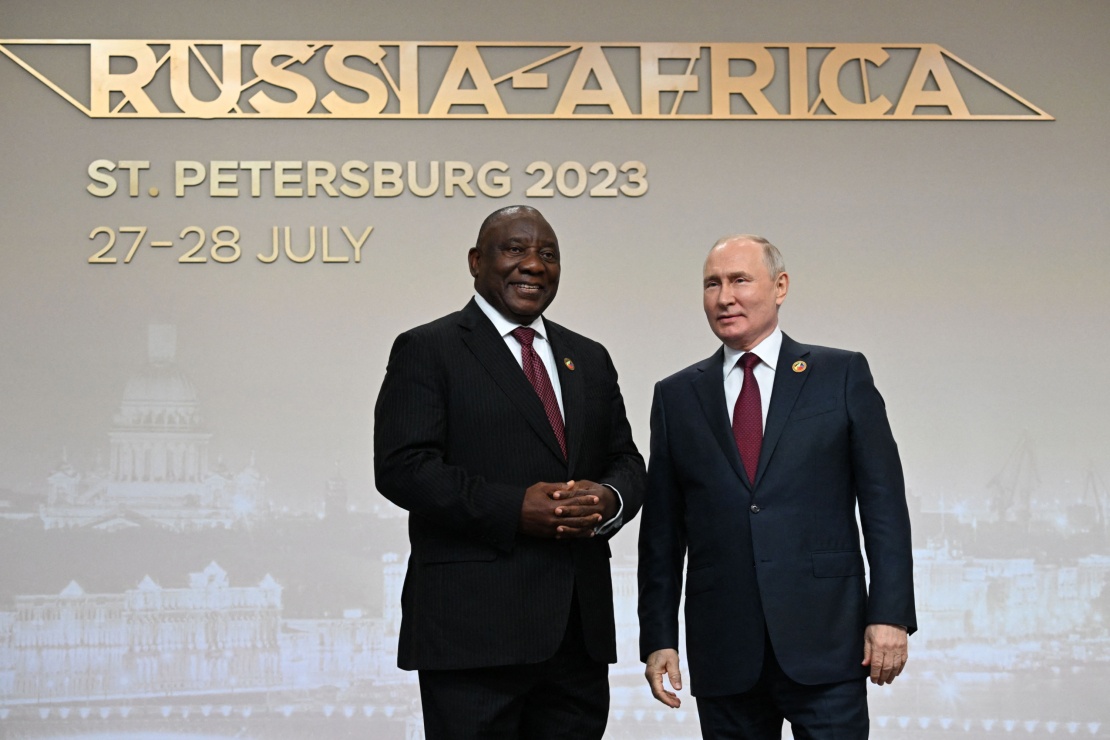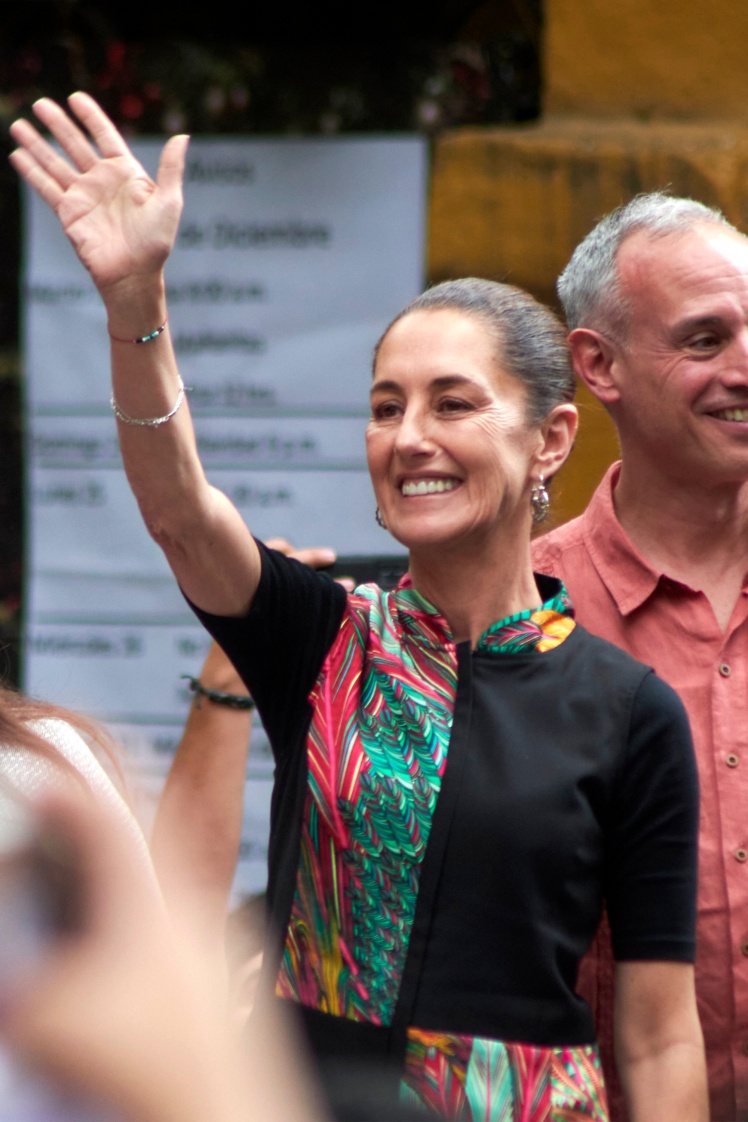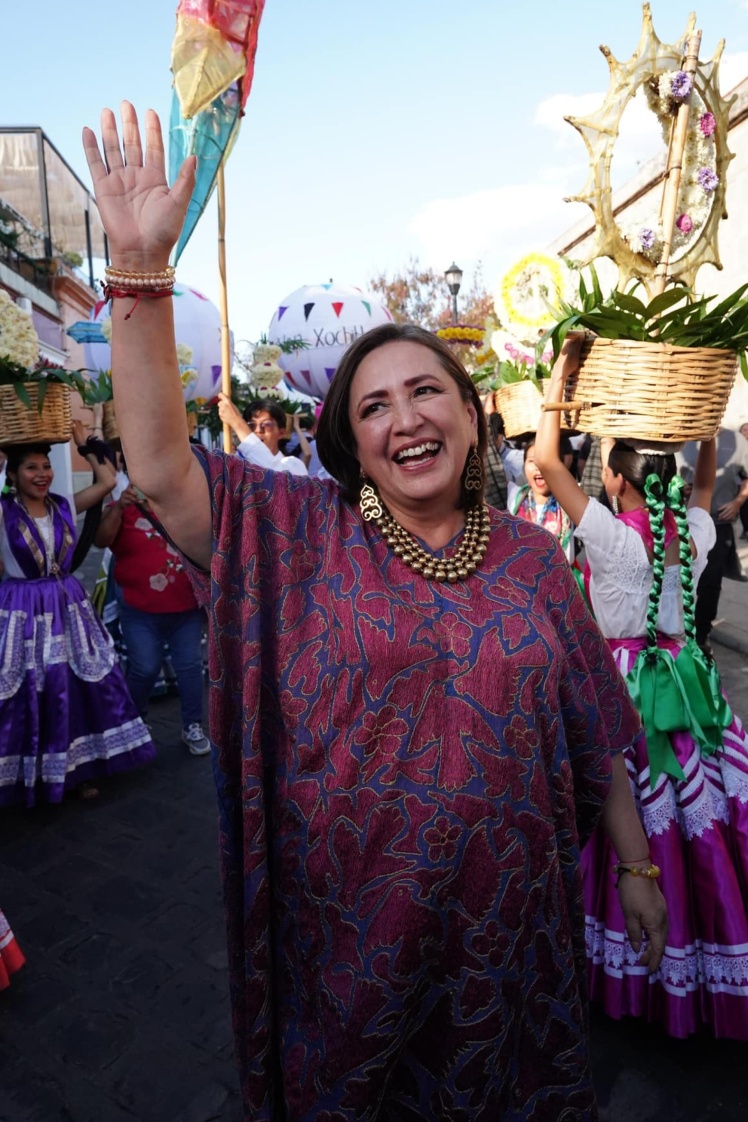Republic of South Africa, parliamentary elections in May 2024
In South Africa, the head of state is elected by the National Assembly, the lower house of the parliament. That is why parliamentary elections there are, in fact, presidential elections. The first democratic elections in the country were held in 1994, and since then the majority in parliament has been held by the African National Congress(ANC), which elects its leaders as presidents.
Vladimir Putin welcomes South African President Cyril Ramaphosa at the Russia-Africa Summit in St. Petersburg, July 27, 2023.
Getty Images / «Babel'»
In 2024, everything can change. According to various polls, the ANC can gain only 41-46.5%. The main opposition party "Democratic Alliance" — 23-31%. Its leader John Stenheisen advocates cooperation with the West, publicly supports Ukraine and condemns Russiaʼs invasion. Stenheisen came to Ukraine in May 2022, and then wrote a lot about the destruction and war crimes of the Russians.
Moreover, he condemns the ANC and current president Cyril Ramaphosa for collaborating with Russia. At the beginning of 2023, there were rumors that South Africa could supply weapons to Russia. John Steenhuisen was the first and most vocal South African politician to demand an investigation and criticize Ramaphosa for dealings with Putin.
There is probably no chance of taking the majority from the "Democratic Alliance". But if there is no majority in the ANC, then a coalition will have to be formed. Two other parties that have a chance to enter parliament are the pro-Russian National Socialist Party "Fighters for Economic Freedom" and the Inkatha Freedom Party, which represents the interests of the Zulu people in South Africa.
According to Steenhuisen, the main task of the "Democratic Alliance" is to prevent the ANC and the "Economic Freedom Fighters" from forming a coalition, because this could lead to authoritarianism in the country. This will also be the worst option for Ukraine.
North Macedonia, parliamentary elections on May 8, 2024
North Macedonia has a unicameral parliament, in which the coalition led by the Social Democratic Union (SDUM) currently has a majority. The current president of the country Stevo Pendarovski is also from this party, his term expires only in 2025.
SDUM is a pro-European and pro-Western party, it was under its leadership that Macedonia joined NATO in 2020. Back in June 2022, against the background of the great war in Ukraine, Pendarovski said that Russia is the biggest threat to the Balkan countries. And for North Macedonia in particular, since the country took a course towards integration into the EU and NATO. Pendarovski also supports Ukraineʼs accession to NATO.
SDUM presidential candidate Stevo Pendarovski during a pre-election rally in Skopje on April 14, 2019, ahead of the April 21 presidential election.
Getty Images / «Babel'»
The opposition party VMRO-DPMNE is also popular in the country. Technically, they now have the majority in the parliament, but the SDUM successfully formed a coalition. In the 1990s, VMRO-DPMNE was a conservative but pro-Western party. But in the 2000s, Nikola Gruevski became its leader, and since then the party has turned into the main pro-Russian political force in the country, which opposes the EU and NATO. Also, some political observers say that now the party has actually become neo-fascist and promotes ideas of hatred towards Albanians.
From 2006 to 2016, VMRO-DPMNE had a majority in the parliament, and when they lost power in the elections, they tried to storm the parliament. After that, Gruevski was under investigation for treason, but fled to Hungary, where he received political asylum. The Russian Foreign Ministry then officially supported Gruevski, and accused the SDUM and other members of the coalition of a coup dʼétat.
A man injured during the storming of the parliament by supporters of the VMRO-DPMNE party, Skopje, April 27, 2017.
Getty Images / «Babel'»
According to polls, in this yearʼs elections VMRO-DPMNE can get 39.2% of votes, and SDUM — only 21.8%. In this case, the fate of the future coalition will depend on other parties. The third most popular party is the "Democratic Union for Integration" with a possible 10-11%. In the current parliament, it is in a coalition with the SDUM, but in the past it was also in a coalition with the VMRO-DPMNE.
Belgium, parliamentary elections on June 9, 2024
In Belgium, the election system is quite complex. There are no national parties. The provinces of Flanders vote for their parties, the provinces of Wallonia for theirs, and only the Brussels-Capital Region chooses from all available. Then already in the parliament, parties from different regions form unions. For example, the Flemish "greens" Groen and the Walloon Ecolo act almost as one party in the parliament.
A coalition of social democrats, liberals and "greens" now has a majority in both houses of parliament. The opposition is conservatives from the "New Flemish Alliance" and far-right Eurosceptics "Flemish Interest".
Flemish Interest leader Tom Van Grieken delivers a speech at the partyʼs traditional New Year reception in Londerzeal, January 15, 2023.
Getty Images / «Babel'»
According to polls, the popularity of the Flemish right has grown over the past five years. If in 2019 11.9% of voters voted for "Flemish Interest", now their support is 25-27%. The same with the "New Alliance" — 16% in the 2019 elections and 20-22% according to current polls.
It is difficult to say what the final results will be, especially since in the French-speaking Wallonia, the Socialist Party, which is still the core of the coalition, is in first place according to the polls. But it will be much more difficult to form the same coalition after the next elections and leave the right-wing in the opposition.
There are no openly pro-Russian parties in Belgium. Although in 2014, the representative of the "Flemish Interest" Frank Kreleimann and two other members of the party were "observers" at the illegal Russian "referendum" in Crimea. But now the party refrains from pro-Russian statements. And it even made an exception for Ukrainian refugees, declaring that the general anti-immigrant rhetoric of the "Flemish interest" does not apply to them.
There is one more nuance. It is in Belgium that €200 billion of Russian assets are frozen. Ecolo party deputy and head of the International Relations Committee Samuel Kogolati said in an interview with Babel that there is a theoretical possibility to transfer these assets to Ukraine. But, according to him, it is the conservative parliamentarians who most often oppose it, because they fear that after that Belgium will no longer be an attractive place for public and private assets in general.
Moldova, presidential elections in the fall of 2024
Maia Sanduʼs term as president ends this year. She has already informed that she will run for the second time and will become the main candidate of the pro-European political forces. Almost all other candidates who have a chance of winning are pro-Russian.
President of Ukraine Volodymyr Zelensky and President of Moldova Maia Sandu at the European Political Community (EPC) summit in Bulboac, Moldova, on June 1, 2023.
Getty Images / «Babel'»
Renato Usatîi, a Moldovan-Russian businessman who was accused in 2016 of threatening officials, in particular the then President of Moldova Nicolae Timofti has already informed about his participation in the elections. From 2016 to 2019, Usatîi lived in Moscow, until Interpol recognized the case against him as political persecution.
Another possible candidate is the former president of Moldova Igor Dodon. According to the Washington Post, Dodon and the Party of Socialists of Moldova during his presidency received direct funding from Russia, in particular from “Gazprom”. Personally, Dodon received a monthly salary from Russian curators, and even bonuses.
Vladimir Putin greets Moldovan President Ihor Dodon during a meeting in the Kremlin, Moscow, January 30, 2019.
Getty Images / «Babel'»
The fourth candidate may be Irina Vlah, who managed the Gagauz Autonomous Region from 2015 to 2023. Until 2015, Vlah was a member of the Communist Party of Moldova, and has an openly pro-Russian position.
It is difficult to say yet which of Sanduʼs opponents Russia will bet on. But according to polls, Dodon has the most chances to win. If the elections were held in December 2023, Sandu would get up to 30% of the vote, and Dodon — 24%. Then there would be a second round between them, in which Dodon would already win — 46% against 35%. The ratings of Usatîi and Vlah are much lower — 5-6% each. And in an imaginary second round, Sandu would defeat both of them.
Georgia, parliamentary and presidential elections on October 26, 2024
The party "Georgian Dream — Democratic Georgia" has a majority in the current parliament. It formed the government, and its founder was businessman Bidzina Ivanishvili. The policy of the ruling party of Georgia was twofold. On the one hand, Georgia officially and gradually joined the EU and even received candidate status in December 2023. On the other hand, in the same year, the party and the government constantly made concessions to Russia. For example, they refused to extend the sanctions against some Russian officials, resumed air connections with the Russian Federation.
Georgian billionaire Bidzina Ivanishvili speaks during the first congress of the Georgian Dream political party in Tbilisi, December 11, 2011.
Getty Images / «Babel'»
In October 2023, "Georgian Dream" even tried to announce the impeachment of the President of Georgia Salome Zourabichvili because of her too much pro-European and pro-Ukrainian position.
Elections this year can change a lot. According to polls, "Georgian Dream" can gain only 36.6%. And the opposition alliance "Victory Platform" — 21.5%. "Georgian Dream" has no obvious allies, so in theory it could lose power if "Victory Platform" forms a coalition. But so far it is difficult to say which other parties also have a serious chance of entering the parliament.
On January 5, 2024, Bidzina Ivanishvili, who had hardly appeared in public for three years, announced that he was returning to politics and would personally lead "Georgian Dream" to the elections. The opposition responded by saying that Ivanishviliʼs return is a sign that Russia will try to influence the election results.
Also, in 2024, presidential elections will be held in Georgia, for the first time under the new system — not by direct voting, but through a college of voters appointed by the Central Election Commission. There is no collegium yet, so it is still too early to make predictions about these elections. But the president in Georgia has quite modest powers. Key elections are parliamentary.
India, parliamentary elections in the spring of 2024
The MPs of the Lok Sabha — the lower house of the parliament — will be elected in India. Currently, the National Democratic Alliance coalition, led by the center-right Bharatiya Janata Party, whose representative is the current Prime Minister Narendra Modi, has a majority there.
Prime Minister Narendra Modi greets supporters during celebrations after the partyʼs victory in the Madhya Pradesh, Rajasthan and Chhattisgarh state legislative elections in New Delhi on December 3, 2023.
Getty Images / «Babel'»
The main opposition is the Indian National Inclusive Development Alliance, centered on the center-left Indian National Congress and its leader Mallikarjun Kharge.
In total, more than 40 different parties are now represented in the lower house, but the Bharatiya Janata Party is the largest, with 290 of the 543 seats, which together with its coalition allies gives it a majority. According to polls, Modiʼs coalition is most likely to win again with 42% of the vote. But the opposition coalition Kharge is breathing down its neck — 38%.
Any result will change little for Ukraine. One of the leaders of the opposition Rahul Gandhi spoke in Brussels in September 2023 and said that the opposition disagrees with Modiʼs political course in many respects, but they have a common view on relations with Russia — despite everything, India will remain Russiaʼs economic partner.
Mexico, presidential and parliamentary elections on June 2, 2024
The next presidential election in Mexico is interesting because the two main candidates who have the best chances of winning are women. Although earlier the presidents of the country were exclusively men. Current President López Obrador cannot run for office — Mexican law provides for only one presidential term, and it is not possible to hold office even temporarily.
The main candidate is Claudia Sheinbaum, according to polls, at least 58% of Mexicans are ready to vote for her. Scheinbaum is from a family of Lithuanian and Bulgarian Jews who immigrated to Mexico in the first half of the 20th century. She is a doctor of physical sciences, climatologist and former mayor of Mexico City. But more importantly, Scheinbaum is a longtime Obrador ally. They began working together back in 2000, when Obrador was mayor of Mexico City and Scheinbaum worked on his team as secretary of the environment. Since 2014, they have been in the same party association — the center-left MORENA.
Claudia Sheinbaum meets with supporters on December 9, 2023 in Coyoacan, Mexico. Sochil Galvez greets supporters in Oaxaca, Mexico on January 5, 2024.
Getty Images / «Babel'»; Facebook / «Бабель»
Her opponent is Xóchitl Gálvez, a Mexican woman of Indian origin from the opposition association "Broad Front of Mexico". Its level of support is 33%. She entered politics from business — she was the general director of the telecommunications giant OMEI, and in 2000 she was included in the list of 25 key entrepreneurs of Latin America according to the version of the Business Week magazine.
Both candidates have publicly condemned Russiaʼs invasion of Ukraine, and both emphasize that Mexico is a neutral country. And they call for an immediate cessation of hostilities. At the same time, there is still a difference in views on foreign policy. Gálvez promises to negotiate with Donald Trump if he wins the US elections, and believes that as businessmen they will find a common language. The "Broad Front of Mexico" generally focuses on cooperation with the Republicans politically close to it. Scheinbaum and MORENA are with Joe Biden and the Democrats.
Parliamentary elections in Mexico will most likely not bring any surprises. MORENA has the same rating as Scheinbaum — about 60%. Therefore, the party is likely to get a majority in the parliament.
You can also make a choice — just now vote for quality journalism by donating: 🔸 in hryvnia , 🔸 in cryptocurrency , 🔸 Patreon , 🔸 PayPal: [email protected]



